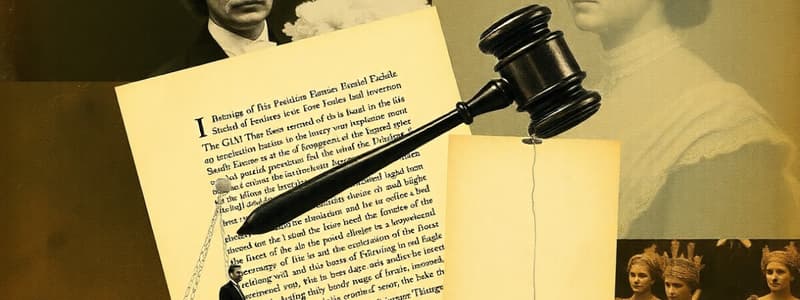Podcast
Questions and Answers
In statutory interpretation, what is the primary goal when the language of a law is ambiguous?
In statutory interpretation, what is the primary goal when the language of a law is ambiguous?
- To ascertain and implement the legislature's intent in enacting the statute. (correct)
- To prioritize the stability and predictability of legal precedent above all else.
- To apply the most literal and restrictive definition of the words used.
- To defer to the interpretations provided by legal scholars and commentators.
How does the principle of stare decisis influence statutory interpretation?
How does the principle of stare decisis influence statutory interpretation?
- It allows judges to freely adapt statutory interpretations to contemporary social values.
- It requires that all interpretations be ratified by a legislative body to ensure democratic legitimacy.
- It compels courts to adhere to interpretations established in previous decisions by higher courts, promoting predictability and stability. (correct)
- It encourages courts to disregard previous rulings in favor of a fresh analysis of the statutory text.
In the context of interpreting penal statutes, which approach is typically adopted when the law is unclear?
In the context of interpreting penal statutes, which approach is typically adopted when the law is unclear?
- The interpretation that aligns with the broadest possible interpretation of legislative intent is used.
- The interpretation that favors the party facing the penalty is favored. (correct)
- The interpretation that maximizes punishment is applied to deter future offenses.
- The interpretation that aligns with similar laws in other jurisdictions is adopted.
What was the central issue in the Persons Case of 1929?
What was the central issue in the Persons Case of 1929?
What is the most accurate interpretation of the relationship between the judicial branch and parliament?
What is the most accurate interpretation of the relationship between the judicial branch and parliament?
In which of the following scenarios would a judge most likely need to engage in legal interpretation?
In which of the following scenarios would a judge most likely need to engage in legal interpretation?
A law lists 'cars, trucks, motorcycles' as vehicles subject to a specific tax. Applying the ejusdem generis principle, which additional vehicle type would most likely be included under this law?
A law lists 'cars, trucks, motorcycles' as vehicles subject to a specific tax. Applying the ejusdem generis principle, which additional vehicle type would most likely be included under this law?
Which of the following best describes the 'mischief rule' (rule in Heydon's case) in statutory interpretation?
Which of the following best describes the 'mischief rule' (rule in Heydon's case) in statutory interpretation?
A statute lists specific types of animals that are prohibited from being kept as pets within city limits: 'lions, tigers, bears.' If the principle of expressio unius est exclusio alterius is applied, which of the following is the most direct implication?
A statute lists specific types of animals that are prohibited from being kept as pets within city limits: 'lions, tigers, bears.' If the principle of expressio unius est exclusio alterius is applied, which of the following is the most direct implication?
A statute aims to regulate 'vehicles' used within national parks, but does not define 'vehicles.' An individual is using an electric scooter. Applying the principle of noscitur a sociis, which of the following factors would be most important in determining if the scooter falls under the statute's definition of 'vehicles'?
A statute aims to regulate 'vehicles' used within national parks, but does not define 'vehicles.' An individual is using an electric scooter. Applying the principle of noscitur a sociis, which of the following factors would be most important in determining if the scooter falls under the statute's definition of 'vehicles'?
In a complex legal case involving interpretation of 'cruel and unusual punishment', what considerations might a judge take into account beyond the literal wording of the law?
In a complex legal case involving interpretation of 'cruel and unusual punishment', what considerations might a judge take into account beyond the literal wording of the law?
Which of the following is an example of external evidence that a judge might consider when interpreting a statute?
Which of the following is an example of external evidence that a judge might consider when interpreting a statute?
Under the 'Golden Rule' of statutory interpretation, when should a court deviate from the plain meaning of a statute?
Under the 'Golden Rule' of statutory interpretation, when should a court deviate from the plain meaning of a statute?
Flashcards
Penal Statutes Rule
Penal Statutes Rule
In criminal law, ambiguity in statutes is resolved in favor of the individual facing penalty.
Statutory Interpretation
Statutory Interpretation
The primary goal is to understand what the legislature intended, especially when the law's meaning is unclear.
Judicial Deference
Judicial Deference
Courts generally respect the law-making powers of the Parliament and are hesitant to interfere with their decisions.
Stare Decisis
Stare Decisis
Signup and view all the flashcards
Why follow Precedent?
Why follow Precedent?
Signup and view all the flashcards
Legal Construction
Legal Construction
Signup and view all the flashcards
Judicial Discretion
Judicial Discretion
Signup and view all the flashcards
Precedent
Precedent
Signup and view all the flashcards
Plain Meaning Rule
Plain Meaning Rule
Signup and view all the flashcards
Golden Rule
Golden Rule
Signup and view all the flashcards
The Mischief Rule
The Mischief Rule
Signup and view all the flashcards
Expressio unius est exclusio alterius
Expressio unius est exclusio alterius
Signup and view all the flashcards
Ejusdem generis
Ejusdem generis
Signup and view all the flashcards
Study Notes
- Judges can't solely rely on the law itself in complex cases; they must consider economic impacts and beliefs.
Legal Interpretation
- Needed because common law tradition can be unclear and ambiguous.
- Legal construction pertains to judges interpreting unclear laws, exercising judicial discretion.
- Multiple plausible outcomes can arise in a legal case, like R v Lacasse (2015).
Precedent
- Examination of past cases; when past cases have unclear or multiple rules, legal interpretation is required, playing a critical role.
Statutory Interpretation
- Rules and principles require looking at what the law explicitly states (actual words) and what can be inferred (external evidence). Evidence encompasses parliamentary debates, commission reports, and statements from legislators.
The Method
- Centers on three key rules with distinct rules:
- Plain Meaning Rule: Requires a literal reading of the statute.
- Golden Rule: Prescribes reading statutes in context to avoid inconsistency or absurdity.
- The Mischief Rule (‘Rule in Heydon's case’): Statute interpretation aligns with the legislature's intentions.
Statutory Interpretation: Method
- Three key grammatical principles:
- "THE EXPRESSION OF ONE IS THE EXCLUSION OF THE OTHER" (Expressio unius est exlusiu alterius): if the law lists one thing, it specifically excludes others. Taxing buildings with or without land is an example.
- LIMITED CLASS RULE (ejusdem generis): when a general term follows specific ones, it includes only similar items;
- TO BE KNOWN BY ITS ASSOCIATES (noscitur a sociis): general words preceding specific lists are similarly defined.
Rule in Penal Statutes
- Applies only to criminal law, resolving ambiguity in favor of the party at risk of penalty.
- Determining the legislature's intention is the ultimate goal, especially when laws are inherently ambiguous.
- Note, ordinary words can be displaced by the law.
Judicial Discretion/ Deference
- Parliament can broadly legislate, respected by judges who are reluctant to interfere.
The Persons Case, 1929
- Five women petitioned to interpret Section 24 of the British North America Act (1867) to include women as "persons."
- The case was important because only "persons" could be appointed to the Senate.
- The Supreme Court initially ruled no, but the UK Privy Council overturned, stating the exclusion of women from public office was barbaric.
Precedent
- "The guiding hand of statutory interpretation."
- Stare decisis means "to stand by decided things.
- The decisions of higher courts guide future rulings for predictability, stability, and certainty.
Problems can include
- Rigidity, illogical decisions, and reversal issues.
Studying That Suits You
Use AI to generate personalized quizzes and flashcards to suit your learning preferences.
Related Documents
Description
Explore legal interpretation through statutes and case precedents. Understand the roles of plain meaning, golden rules, and external evidence in judicial discretion. Learn how judges address ambiguities in law.




